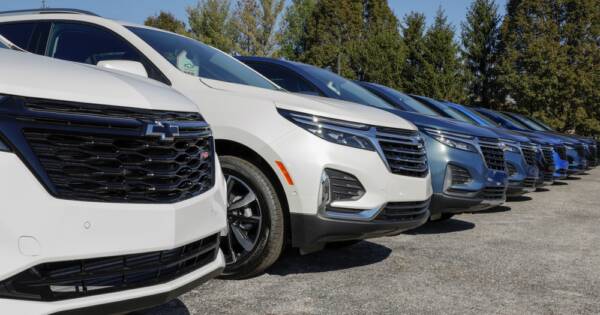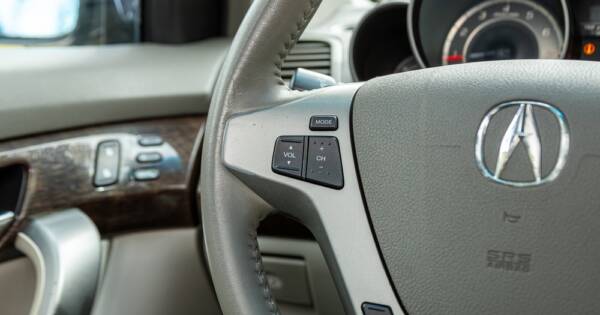- Buying a new car (or a used one) is a major purchase, and shouldn’t be taken lightly.
- Inexperienced buyers can cost themselves thousands of dollars with just a simple mistake or two.
- High pressure sales tactics often lead to making costly decisions.
Buying a car is not easy. In fact, it can be a stressful experience for even the savviest consumer. Salespeople at dealerships or used car lots do their very best to get as much money out of customers as they can, and that often involves trickery and shenanigans designed to confuse people and separate them from the contents of their wallets.
It’s not surprising that many people drive off a car lot feeling as though they have been taken advantage of. However, in many cases consumers are their own worst enemy, making common mistakes that hurt their ability to get the best possible deal for themselves. Here is a list of common mistakes people make when buying a vehicle – new or used.
12. Buying Extended Warranties
Never buy an extended warranty under any circumstance. Not just when it comes to vehicles — never buy an extended warranty on a television or video game console either. Most retail outlets will find a reason in the fine print not to honor an extended warranty should you ever need to use it. Plus most regular warranties are sufficient enough. Yet extended warranties are particularly popular among second hand, pre-owned, or used cars.
Dealerships and salesman love to try and sell people extended warranties on everything from the car’s engine to the transmission, radio and tires. Don’t be fooled. Extended warranties cost a lot of money with no guarantee of providing any real protection should something go wrong with a vehicle. New cars can also come with extended warranties on items such as the infotainment system, a DVD player, etc., but these too are a cost that is best not incurred.
 Shutterstock
Shutterstock11. Paying Administration Fees
There could be a separate list of annoying fees charged by car dealerships, but none is more egregious than the “administration fee” that most car dealerships pass onto their cash strapped customers. Some dealers also call this a “processing fee” or “documentation fee,” but it is all the same thing – it’s the cost to cover processing the paperwork on the sale of the car you bought.
Believe it or not, some dealerships charge $400 to $500 for this administrative work. Any way you look at it, that is an outrageous sum – especially since this administrative work would need to be done regardless of who pays for it. And who benefits from the proper processing of the paperwork? Only the dealership. The fact that they even try to pawn this cost off on their customers is an insult. Don’t believe anyone who tells you this charge is non-negotiable. It’s negotiable – right down to zero.
 Shutterstock
Shutterstock10. Accepting a Rebate
Rebates offer an incentive without producing a reward for the customer. Rebates are primarily used to get people in the door initially. Once a vehicle is purchased, the buyer finds that they must jump through a mind boggling series of hoops to get the promised rebate or discover that there is some loophole or trick preventing them from actually getting the full rebate.
While rebates are not a fee charged to customers per se, salesman use them as leverage when haggling with customers – saying they can’t go any lower on the price, but not to worry because you’ll get thousands of dollars back on the rebate. Truth is that rebates come from the vehicle manufacturer and usually apply regardless of the price that a person negotiates with the car dealership. The best thing to do is negotiate as if there is no rebate, or forget that a rebate is even being offered.
 Shutterstock
Shutterstock9. Agreeing To a Low Trade-in Value
This is one of the more obvious tactics used by car salespeople, but it continues to be employed just about everywhere. To start off, a salesperson will offer you a ridiculously low value for the current car you own. This is the “sucker test.” The salesperson essentially wants to see if you’re a sucker and will take the bait. However, as you continue talking and negotiating, the salesperson will gradually, albeit slowly, raise the amount he’ll offer you for your used car.
As this happens, you feel that you are winning the negotiation and getting more money and value for your car. Really though, the salesperson started with such a low offer on your current vehicle that you’re still getting ripped off. You walk away thinking you got $4,000 for your used car, when really you should have gotten $7,500 for it if you sold it yourself. Do yourself a favor and sell your own car (privately), and then take the money you get for it to the car dealership and put it towards the next car that you buy. The convenience of simply trading it in will never be worth the money it costs you.
 Shutterstock
Shutterstock8. Focusing On Monthly Payments Over Total Price
You’re not paying $40,000 for this car. You’re paying $400 a month for it. That’s how salespeople want you to think about your next car purchase. Don’t think about whether you can afford $40,000. Just think about whether you can afford $400 each month. This is a psychological tactic that salespeople use, and it’s surprising how effective it can be.
You’ll hear lines said like “If I can get you into this car for $400 a month, would that work for you?” Of course it would! But what you’re not paying attention to is the length of the payment plan, the interest rate you’ll be charged, and how much money you’ve actually spent once the car is paid off. Truth is that a car salesperson can get you any monthly payment you want. All they have to do is extend the length of the car loan and raise the interest rate. In the end, you might end up paying $50,000+ for that $40,000 vehicle.
 Shutterstock
Shutterstock7. Handing Over a Credit Card
The ultimate psychological ploy has to be when the car salesperson asks you, upfront, for a credit card. They take your credit card to the back office and don’t return with it. They hold it throughout the entire negotiation. You feel that you need to make a deal right away order to get your credit card back. Then you wonder what they’re even going to do with your credit card. After a while, you start to feel like hostage, and that is exactly the point.
The sales staff wants you to feel trapped and that you must negotiate with them. Taking your credit card is a way for salespeople to ratchet up the pressure on you. In many cases, you might feel like you’ve already bought the car. The only question left to answer is for how much money.
First, you should never give anybody your credit card. Second, you’re not obligated to give anybody your credit card – certainly not a car salesperson. Third, even if a car dealership has your credit card, it would be illegal for them to charge anything to it without your permission or refuse to give it back if you asked for it. So relax! You have more power in the car buying negotiation than you realize. Just remember, the most powerful word is “no.”
 Shutterstock
Shutterstock6. Paying For Unnecessary Extras
Similar to unnecessary fees, car dealerships love to pile on unnecessary extras that they use to run up the amount of money you pay for a car. Case in point: rustproofing. Every vehicle made today has excellent rustproofing, and most are undercoated when they leave the factory where they were assembled. This fact hasn’t stopped many car dealerships from trying to sell their customers on rustproofing as an “option.” People get worried about protecting their new expensive purchase, and are often tricked into paying.
Dealers are happy to charge upwards of $1,200 for this completely fabricated and unnecessary service. Do yourself a favor and just say “no” to any and all extra options. Keep in mind that if you really want to get your car rustproofed, it typically costs $200 at a garage. You can get almost any other after market upgrade (tinted windows, floor mats, etc) cheaper outside the dealership too. The mark-up on “options” are outrageous.
 Shutterstock
Shutterstock5. Not Inspecting The Car
If you don’t know a fan belt from an air filter, then you better enlist some expert knowledge. Make sure that any car you’re considering buying, whether it’s brand new or gently used, is subject to a thorough inspection. A well-informed friend or family member is a good start. However, it’s always worth paying a certified (and trusted) mechanic to do a more thorough inspection before you sign anything.
You should get a professional inspection, even if you consider yourself fairly mechanical skilled. The advanced technology in modern cars is much more complicated than checking for loose bolts, dirty oil, or worn tires. Go ahead and protect yourself (and your money) by consulting a true expert.
 Shutterstock
Shutterstock4. Not Being Realistic
You can be the most prepared car buyer ever and still miss out on a good deal because you wanted a better one. Every seller is going to have a bottom line price. If you keep insisting that they go lower — or throw in even more extras — the seller will be the one who eventually walks away from the deal. Remember, you’re not the only person out there trying to buy a car. They’ll just wait for someone else to be interested.
So make sure you understand the realities of the car buying market. For example, 2022 saw used car prices shoot up as global supply chain shortages caused new cars to be in low supply. That same issue created long waits for new car deliveries. That means you can get a deal on a new car — if you’re willing to wait six or twelve months for delivery. Again, be realistic. If you get a discount on a new car because it won’t be ready until Christmas, don’t start harassing the dealer about delivery in July.
 Shutterstock
Shutterstock3. Allowing Yourself To Be Manipulated
Built on the tried and true “good cop, bad cop” routine is the similar “good salesperson, bad manager” shtick. This is when the car salesperson presents themselves as the trusted and honest broker who is trying their best to get you a great deal. But darn it, their manager is just such a hard ass. No matter how hard the salesperson tries, the manager just won’t go for the deal you have negotiated.
The salesperson goes back to run the deal by his or her manager several times, leaving you sitting and waiting for extended periods each time, only to return again and tell you it’s a “no go” and proposing something else that is slightly more expensive for you. This routine is a bunch of malarkey. The next time the salesperson heads to the back to talk to their manager, follow them and see what they’re really doing. Chances are they’re just pouring themselves another cup of coffee.
 Shutterstock
Shutterstock2. Not Negotiating At All
A car dealership is no place to be timid. Many customers, however, turn into frightened children once they set foot on a car lot. They seem to forget that they can negotiate the terms of the vehicle they want to buy. Yes, we know that a lot of sales folks like to start off their pitch by saying that they “don’t really negotiate,” but that is baloney. If you hear anyone say this, you should turn and walk out the door.
The truth is that everything is negotiable when it comes to a vehicle purchase. From the tires to the paint color and the interior fabric. Literally everything on (and inside) a car is negotiable. So too is the price, the interest rate charged, and the length of a lease or finance plan. It can all be negotiated. People just need to be willing to do the negotiating. Don’t be shy and timid. Stand firm when negotiating. If you don’t like what is being offered, or the way the salesperson is behaving, you can always walk away.
 Shutterstock
Shutterstock1. Not Doing Your Homework
The single biggest mistake people make when buying a vehicle is not doing their homework before visiting a car dealership. Of course, it helps to know what is out there, and what the average prices being charged for various vehicles are. Thanks to the internet, it’s never been easier. With a few clicks of a mouse, people can easily see how much cars they’re interested in are selling for, based on things like mileage and condition.
Knowing this information helps buyers form a price range in their mind, set a realistic budget, and decide on a maximum price that they are willing to pay. It will also help to sniff out a salesperson who is feeding you a bunch of crap. Knowledge is power, as they say, and there’s never been more knowledge at the fingertips. So search away and do your homework, before you even bother with that first test drive.
 Shutterstock
Shutterstock
